BenQ X300G review: a budget 4K projector for gaming and movies
BenQ X300G 4K projector: one-minute review
If you love to sit back and enjoy movies but also like to lean in and get sweaty with the latest competitive games, the BenQ X300G could be just the projector for you. This short-throw model combines impressive capabilities in a compact package that rivals Xgimi’s Horizon Pro and Horizon Ultra.
The BenQ X300G manages decent color from its LED light source, and puts on a strong show with bright, 4K visuals. But it can also dial up the speed, switching to a 1080p/240Hz mode for fast, responsive gaming. We’ve seen this trick in action on the BenQ X3100i, and it’s a real treat for gamers.
Between its cinematic capabilities and gaming prowess, the BenQ X300G has a lot to offer. There’s room for improvement — the limited ports and so-so audio come to mind — but at $1,799, this projector puts up a respectable value, especially with its ability to play dual roles, something that not all the best 4K projectors can do.
BenQ X300G 4K projector review: price and release date
- Release date: December 2023
- MSRP: $1,799 (around £1,400 / AU$2,720)
The BenQ X300G is a fairly new model in BenQ’s lineup. With an original price of $1,799 (around £1,400 / AU$2,720), the projector hasn’t yet seen any discounts, though its price is reasonable for a 4K model.
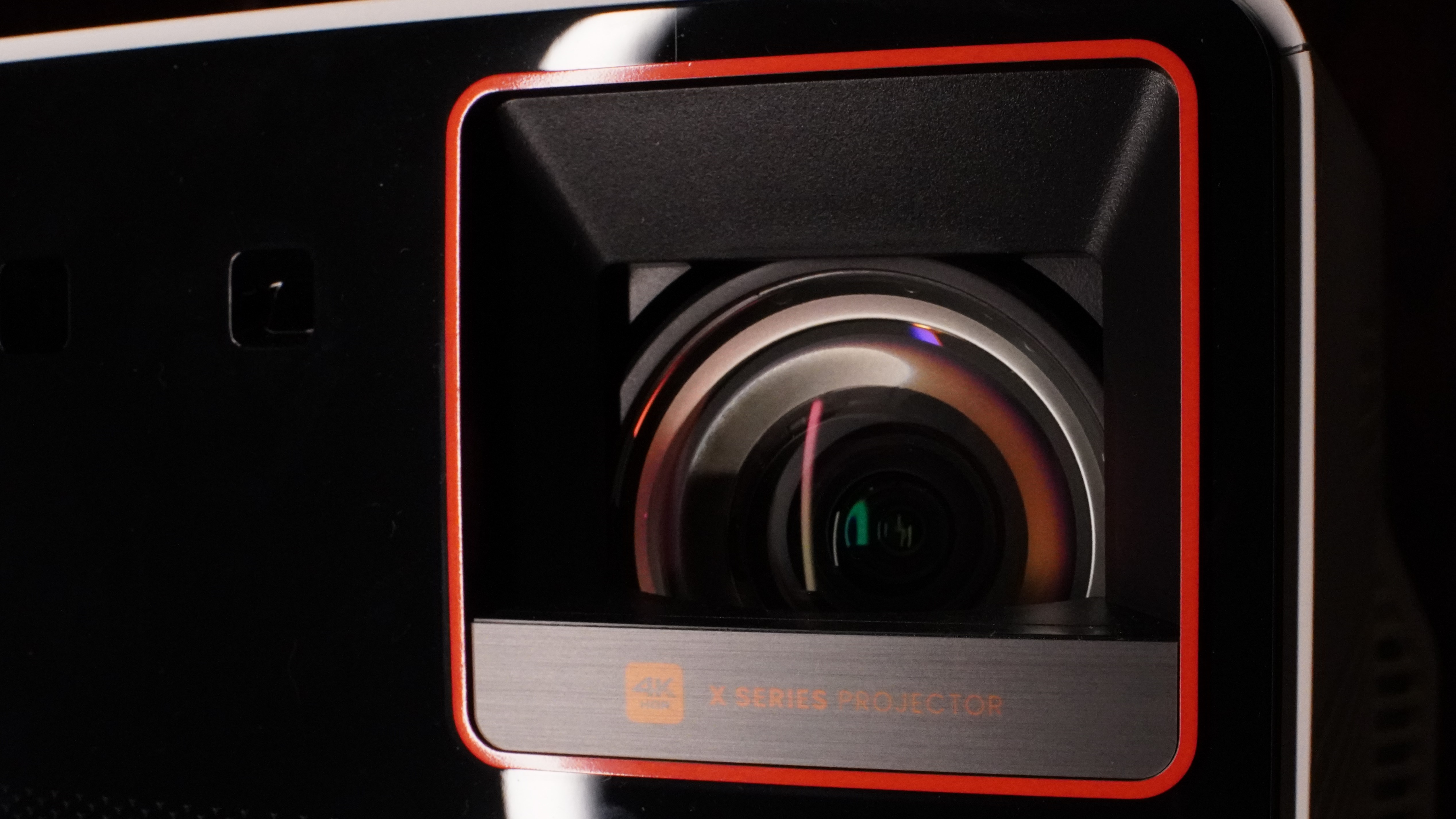
BenQ X300G 4K projector review: Specs
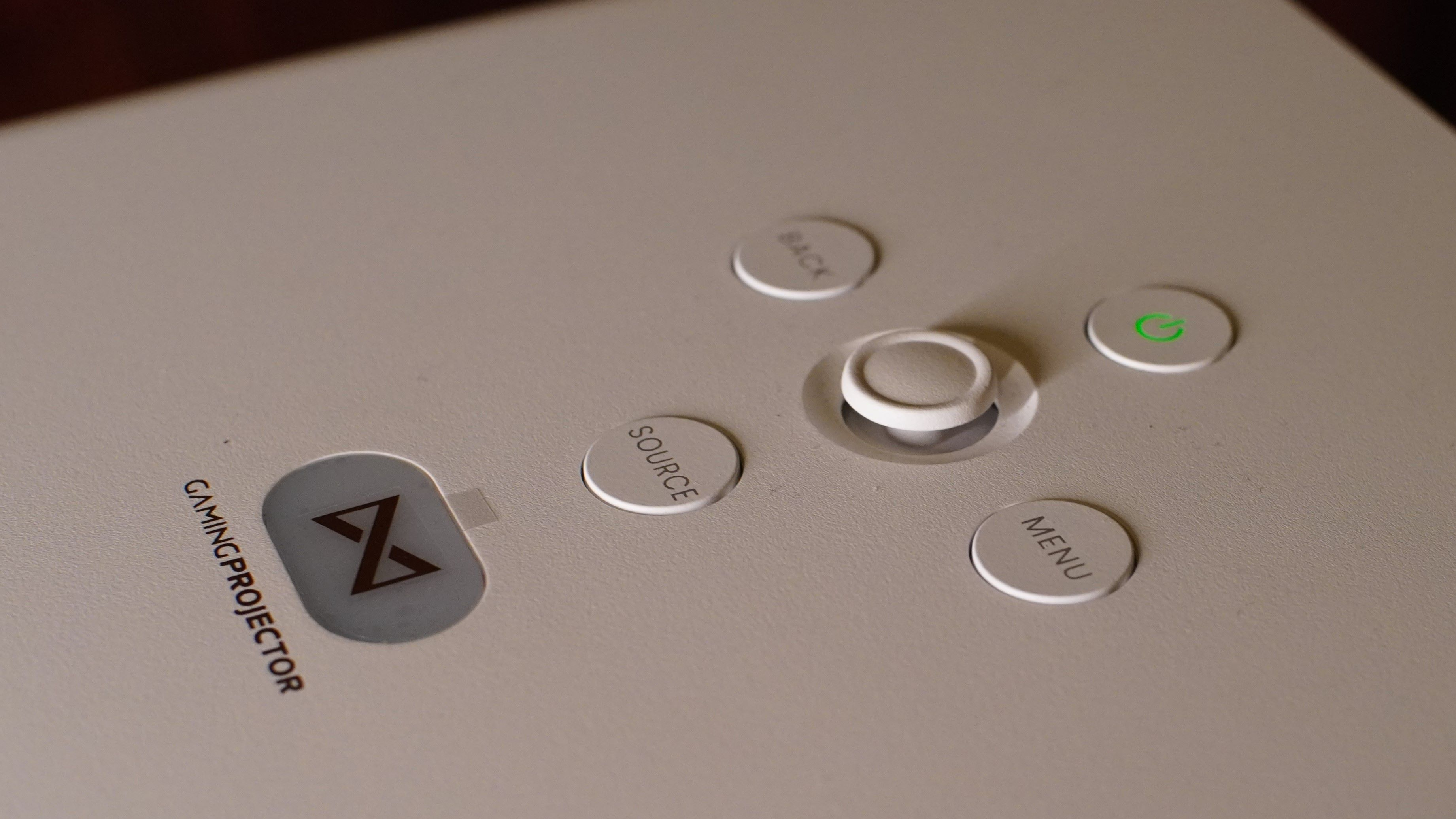
BenQ X300G 4K projector review: design and features
- Compact and flexible design
- Built-in speakers and streaming stick
- Rare DisplayPort over USB-C support
The BenQ X300G takes up less than a cubic foot and has roughly cube-like dimensions. Inside that small footprint, it packs a 2,000-lumen DLP projection system, 2.1-channel speakers, an internal streaming dongle, and the necessary hardware for optical zoom.
It’s an impressive package and not an unsightly one. Like many of BenQ’s recent designs, the BenQ X300G has a mostly white, plastic chassis complemented by a glossy black face with orange accents. In this case, those accents also extend to little LED fins that protrude from the projector’s back edges. That orange glow calls to mind heat – not a good thing for a projector – though the BenQ X300G deals with that well. Its internal fans do emit a light buzzing noise, but the sound is easily drowned out by its speakers.
The whole unit sits on rubber feet for grip. The front foot is especially wide and built around a hinge for propping the front of the projector up to adjust its projection angle, though the feet don’t offer any horizontal tilt adjustment if the projector is set on an uneven surface. There is also a threaded hole for mounting onto a tripod or ceiling mount.
The BenQ X300G includes a few ports on its side and uses an external brick for power. There’s an HDMI 2.0 port with eARC, a USB-C port with DisplayPort support — a rarity among projectors – and a USB 2.0 port. I found it regrettable to see neither a 3.5mm audio jack nor an optical audio output. The rear of the BenQ X300G hides a small compartment that hides BenQ’s included streaming stick. This has a built-in mini HDMI cable and micro USB cable for charging, and this fairly unusual design offers limited options for swapping the dongle out for a different unit such as a Roku or Amazon Fire TV streaming stick down the line.
A large remote control operates both the included dongle and the projector. This has similarities to typical Android TV remotes but also quite a few shortcuts to projector settings. Backlighting provides helpful visibility in the dark, and activates after a button has been pressed. In addition to the remote, a set of controls is on top of the unit. Manual adjustments are made electronically, including focus, zoom, and keystone. Focus and keystone adjustments can also be made automatically, making setup quite quick.
The streaming stick BenQ includes is a first-party model running Android TV OS 11, which is a little behind the times now, though at least it saw a recent February 2024 security patch. The dongle still provides quick and easy access to the best streaming services like Disney Plus, Max, Netflix, and Prime Video. While Hulu also loaded onto the system without issue, I couldn’t successfully use it as all clicks on the Sign In button failed to register.
- Design and features score: 3/5

BenQ X300G 4K projector review: picture and sound quality
- Short throw provides big picture in smaller rooms
- Good image with movies and games
- Average sound quality
The BenQ X300G is a capable little projector that’s ready to beam a big and bright picture without much fuss. It’s plenty bright for a dim room and excels in the dark, where it can readily produce a gorgeous, large image. In fact, you’ll likely have a hard time getting anything less than a huge picture due to the projector’s short throw.
This projector is better suited for small rooms or coffee table installations. During setup, I already had a 77-inch diagonal image at a little under 4 feet from the screen. The projector’s optical zoom can shrink that down a bit, but if you place the projector at the back of a room, you’ll be sacrificing image quality quickly as it relies on digital zoom to shrink images down beyond the optical zoom range.
Once positioned, the BenQ X300G is a strong projector. Color rendition isn’t the best I’ve seen – BenQ rates it for 84% coverage of the DCI-P3 color gamut – with that crown going to triple-laser models like the Hisense PX2 Pro and LG Cinebeam HU915QE, but it’s not far off. The Na’vi looked plenty blue when I watched Avatar: The Way of Water, and the colorful world of Final Fantasy VII: Remake Intergrade was presented quite well throughout my testing.
A main perk of the BenQ X300G is its flexibility. It can provide a cinematic image with 4K HDR movies and shows at 24 or 60Hz, but also dial up the speed by dropping to 1080p at 240Hz for gaming. The projector’s DLP chip not only provides a high refresh rate but a stunning pixel response time that’s virtually free of ghosting. If competitive gaming is your speed, the BenQ X300G can keep up.
Speed is a critical advantage for the BenQ X300G, as it has competition from other models like the JMGO N1 Ultra and Hisense C1. Both models come in at similar prices and use triple-laser light sources to provide 4K visuals with far more stunning color, but they lack the option to ramp up to 240Hz in game mode.
The BenQ X300G speakers complement the imagery. While not amazing, they do a decent job, pumping out plenty of sound in the small rooms this projector is ideal for. They’ll fall flat unless you’re sitting close in larger rooms, and the sound is grating at high volumes. But at middle volume, they sound clear and full.
- Picture quality score: 4/5
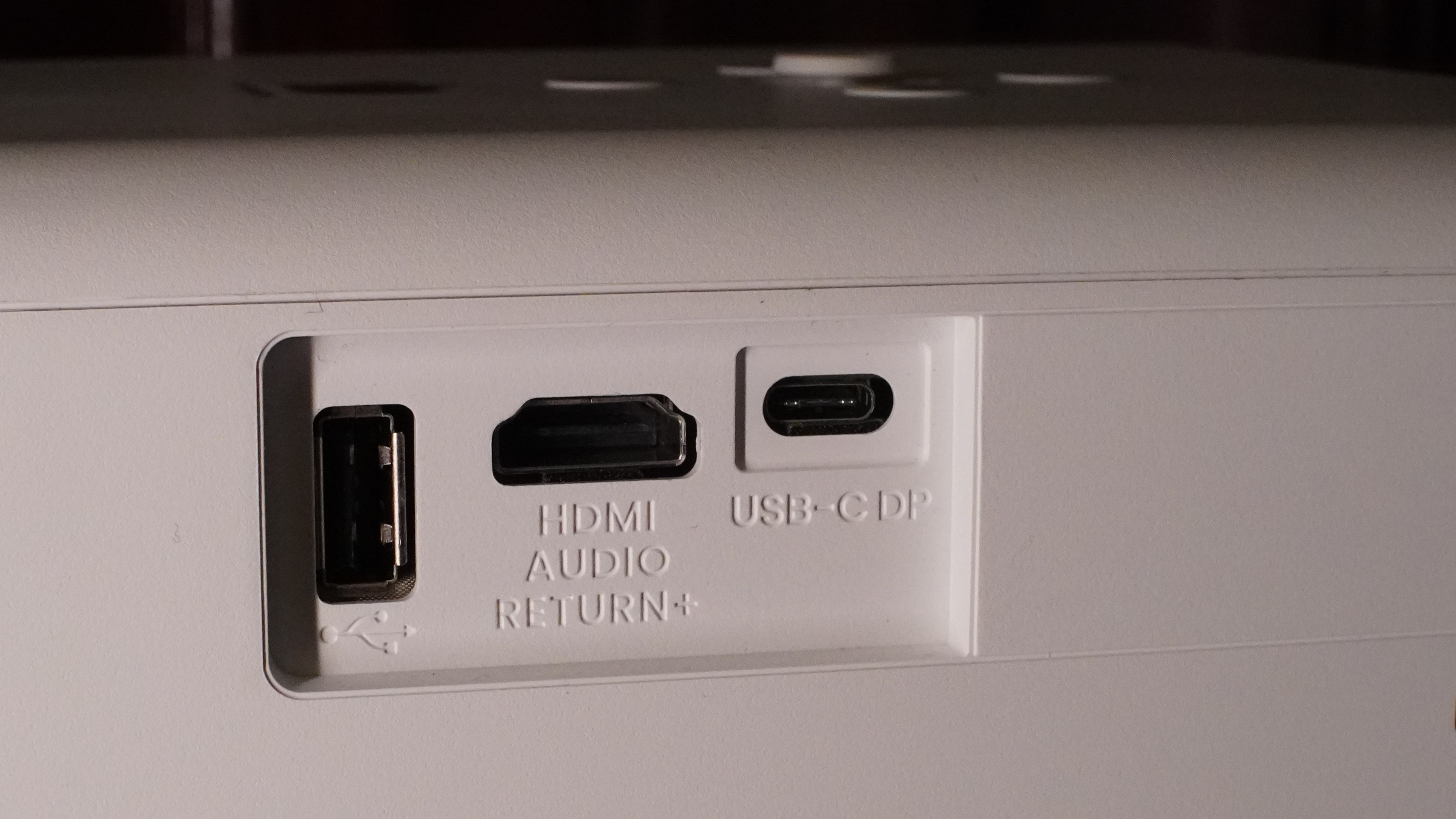
BenQ X300G 4K projector review: value
- Has major competition at $1,799
- Powerful for the price
The BenQ X300G is a strong all-around option. Cinema-focused projectors like the Hisense C1 can do better for the same price but lack the gaming capabilities that set the X300G apart. The BenQ X300G does a great job with both, upping its value for anyone who wants that flexibility. It does cut some corners on the hardware front, so it that’s a concern, the BenQ X3100i offers extra hardware adjustments and image upgrades, but costs $600 more.
- Value score: 4/5
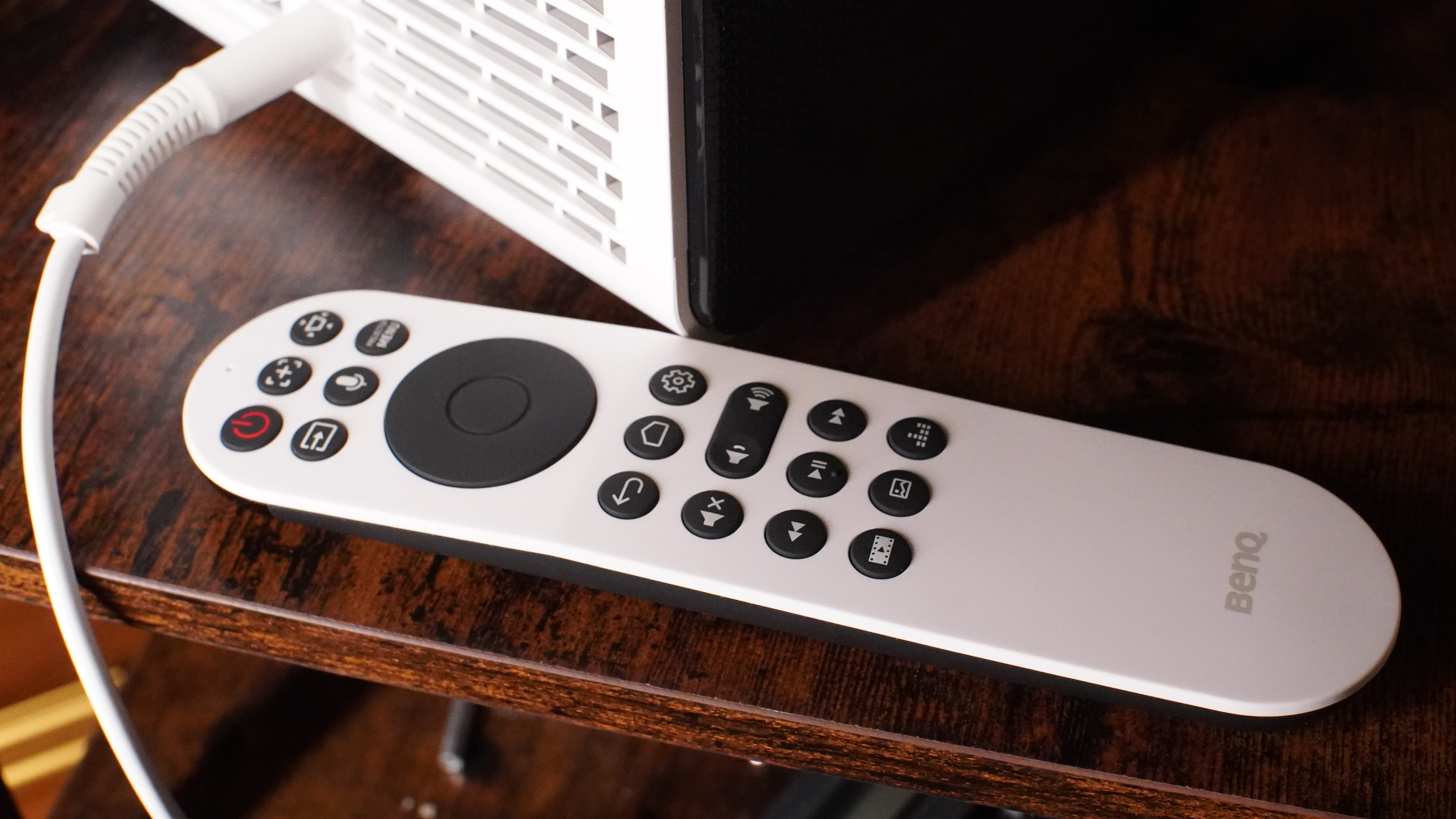
Should I buy the BenQ X300G 4K projector?
Buy it if...
Don’t buy it if…
Also consider...
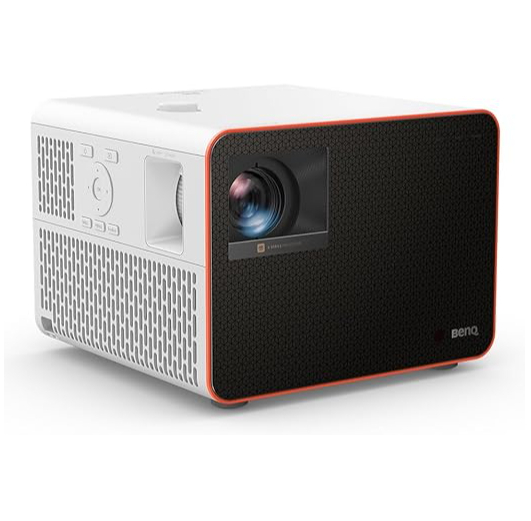
BenQ X3100i
The BenQ X3100i has the same gaming features as the X300G but provides a higher level of visual quality. It also has useful hardware for setup, but comes at a considerable uptick in price.
Here's our full BenQ X3100i review

How I tested the BenQ X300G 4K projector
- Tested at home in multiple, real-world viewing conditions
- Viewed with a variety of media and formats
- I have tested numerous projectors and displays over the last half-decade
I tested the BenQ X300G at home, in real-world conditions. This saw it challenged by ambient light coming in from numerous windows, in-room lighting, and ambient noise that the projector’s speaker system had to overcome. The projector was tested on both a bare, white wall and an Akia Screens CineWhite screen and was presented with streamed HDR and non-HDR content and console gameplay.
My testing evaluates the projector’s performance and takes into consideration its price and competition from other models.
I have been testing projectors since 2021 and displays for even longer.
First reviewed: May 2024
0 comments:
Post a Comment